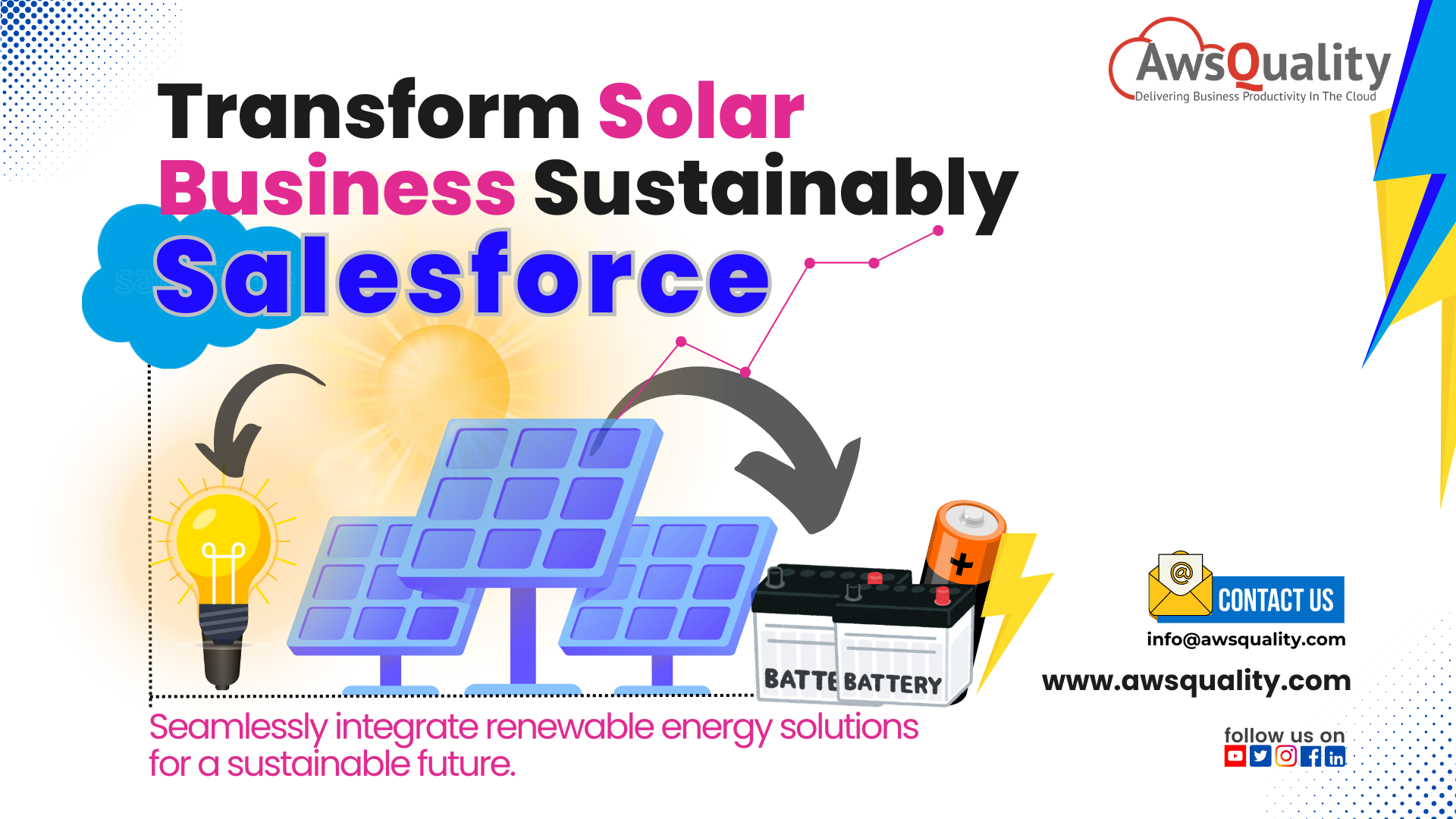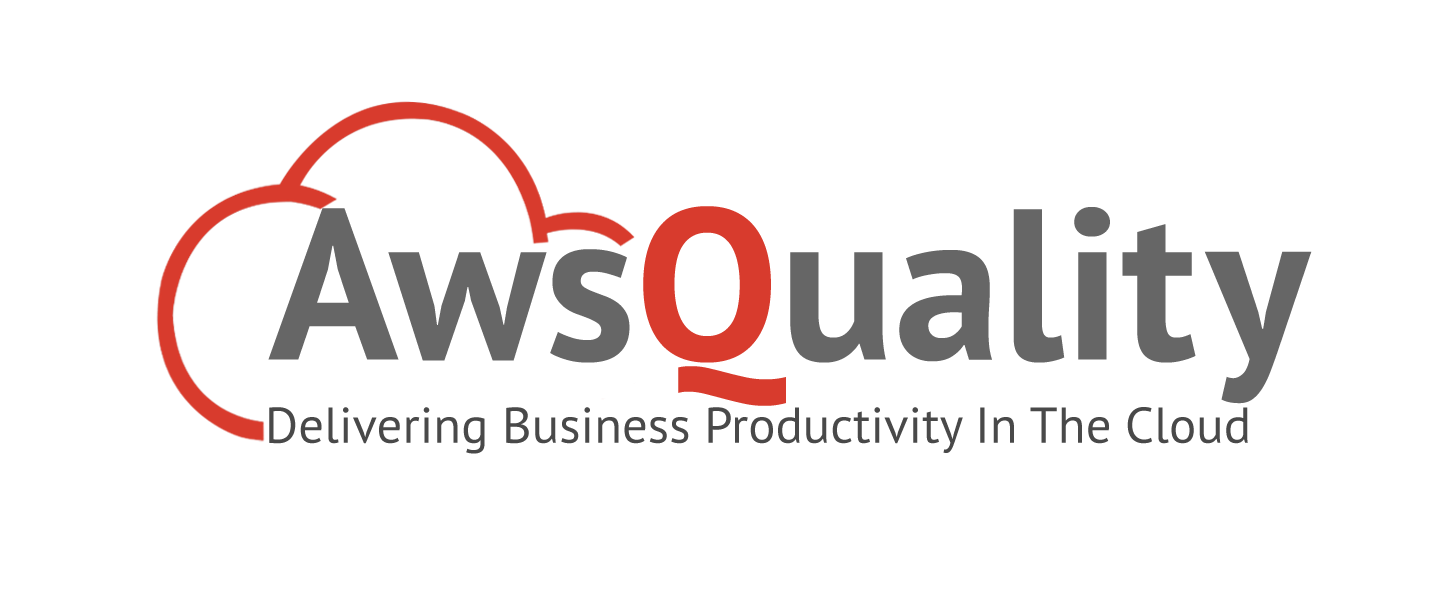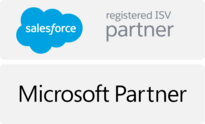
Transform your solar business sustainably with Salesforce. Seamlessly integrate renewable green energy practices for a cleaner, brighter future.
The solar energy industry greatly benefits from Salesforce integration commitment to renewable energy, which includes the company’s purchase of 280,000 MWh of Renewable Energy Certificates. Small businesses can efficiently integrate green energy practices, lower their carbon footprint, and contribute to a cleaner, more sustainable future by leveraging Salesforce’s platform. Salesforce service cloud implementation partners ensure a seamless transition. Let’s examine Salesforce’s influence on the solar energy industry in 2024:
-
Salesforce’s pledge to use renewable energy:
- Salesforce has committed a substantial amount of resources to renewable energy. Their goal is to source all of the electricity they use from renewable sources. They recently unveiled a ground-breaking initiative to do this.
- Salesforce plans to buy 280,000 megawatt hours (MWh) of renewable energy credits from small, distributed energy projects over the course of the next eight years. These projects are situated in developing nations like Southeast Asia, sub-Saharan Africa, Brazil, and India.
- This unique purchase will support the expansion of innovative, high-impact projects in areas heavily reliant on fossil fuels. Salesforce helps to ensure a fair and equitable transition to energy by achieving this.
-
The Solar Energy Sector is Benefiting from Salesforce’s Robust Platform:
- When deployed, Salesforce’s platform can completely automate business procedures associated with solar installation and sales. In the solar business, this automation creates a plethora of potential for growth and profitability.
- Salesforce helps solar companies manage leads, track installations, and handle customer interactions more effectively by reducing operations.
-
Impact on the environment and society:
- Salesforce’s commitment to renewable energy is anticipated to free up $65 million in new solar capacity investments. Globally, the development of clean energy projects will be accelerated by this investment.
- Salesforce’s procurement of renewable energy considerably reduces greenhouse gas emissions, averting over 50,000 tonnes of CO2 emissions yearly.
- By concentrating on non-traditional markets, social and environmental advantages are distributed to the communities who most need them.
-
Trends in Solar Energy for 2024:
- We predict the following developments in the larger solar business in 2024:
- Innovations in Battery Technology: Developments in solid-state and lithium-ion batteries will give businesses and homeowners more economical and efficient ways to store surplus solar energy.
Salesforce is bringing about good change in the solar energy industry with its creative approach to enabling distributed renewable projects and its unwavering dedication to renewable energy. Solar enterprises may improve efficiency and make a positive impact on a cleaner and more sustainable future by utilizing their platform.
Tell me more about Salesforce’s commitment to renewable energy.
It is admirable that Salesforce is committing to renewable energy, as it fits in with their larger sustainability objectives. The salient features of their renewable energy endeavors are as follows:
-
Goal of 100% Renewable Energy
- Salesforce wants to use 100% renewable energy to offset its electricity use. Their commitment to lowering their carbon impact and promoting a cleaner energy future is demonstrated by this ambitious goal.
- Salesforce obtains renewable energy credits (RECs) and makes investments in renewable energy projects in order to meet this objective.
-
Renewable Energy Certificates (RECs):
- A single megawatt-hour (MWh) of generated renewable energy is represented by a tradable certificate known as a REC. A corporation essentially promotes the creation of renewable energy when it purchases RECs.
- Salesforce has pledged to buy 280,000 MWh of Renewable Energy Certificates (RECs) from distributed energy projects in developing nations. These initiatives are spread throughout Southeast Asia, sub-Saharan Africa, Brazil, and India.
- Salesforce makes sure that their conventional energy usage is offset by the addition of an equivalent amount of renewable energy to the grid through the purchase of RECs.
-
Impact on the Solar Energy Sector:
Solar enterprises stand to gain a great deal from Salesforce’s platform. Here’s how to do it:
- Automation: Solar enterprises may automate a range of business operations thanks to Salesforce’s strong platform. Automation increases productivity and streamlines processes, from lead management to installation tracking.
- CRM: Solar enterprises can track sales, manage customer relationships, and improve customer satisfaction by utilizing Salesforce’s CRM services.
- Data insights: Salesforce offers insightful data on market trends, customer behavior, and performance indicators. Decisions made by solar enterprises are informed by this data-driven approach.
-
Benefits to the environment and society:
- Salesforce’s commitment to renewable energy is anticipated to attract $65 million in additional solar capacity investments. The global development of clean energy projects will be accelerated by this investment.
- Salesforce makes a major contribution to the fight against climate change by averting over 50,000 tonnes of CO2 emissions annually.
- By concentrating on non-traditional markets, social and environmental advantages are guaranteed to reach the most disadvantaged populations.
Salesforce actively promotes the development of clean energy across the globe as part of its commitment to renewable energy, which goes beyond corporate responsibility. Their projects serve as an inspiring model for other groups, and their platform supports solar firms.
How can I use Salesforce’s renewable energy integration to integrate green energy practices into my small business?
Using Salesforce to implement green energy practices for your small business requires thoughtful preparation and purposeful execution. Let’s look at various actions you can do:
-
Recognize Salesforce’s dedication to renewable energy:
- Salesforce has made it known that it intends to use only renewable energy (RE). This implies that they annually buy certificates and renewable energy equal to the whole quantity of power they consume worldwide.
- Their objective is to contribute to a long-lasting grid change and pave the way for others to follow, not only to satisfy targets.
-
Layered Renewable Energy Purchasing alternatives:
Renewable energy alternatives are categorized by Salesforce into four kinds, all of which use Renewable Energy Certificates (RECs) for accounting and tracking purposes:
- Onsite Generation: If you have a business, you might want to think about putting in wind turbines or solar panels. Produce your own pure energy.
- With off-site Power Purchase Agreements (PPAs), you can collaborate on renewable energy initiatives. You purchase the energy they generate.
- Invest in green energy projects virtually through PPAs without having to see them in person. The grid gains the additional energy.
- Distributed Renewable Energy Certificates (D-RECs): These cutting-edge financing tools hasten the capital expenditure process for distributed, small-scale renewable projects.
-
Analyze the requirements and values of your company:
- Evaluate your spending, long-term objectives, and trends of energy use.
- Think about which renewable energy solutions fit the aims and values of your business.
-
Work Together with Specialists:
- Speak with professionals in renewable energy or businesses that focus on environmentally friendly solutions.
- They can help you navigate the procedure, determine whether it’s feasible, and suggest the best course of action for your company.
-
Examine Grants and Incentives:
- Examine the grants, tax credits, and incentives that are available for switching to renewable energy.
- Clean energy projects are frequently supported by local and national governments.
-
Make an Energy Efficiency Investment First:
- Give energy saving priority before introducing renewable energy:
- Replace your illumination with LED bulbs.
- Maximize the use of the equipment for heating and cooling.
- Inform staff members on energy-saving techniques.
-
Selecting the Best Renewable Energy Source:
- Typical choices include geothermal, hydropower, wind, and solar energy.
- Take into account elements like location, space availability, and resource availability.
-
Timetable for Maintenance and Installation:
- Proceed with the installation after deciding on a source.
- Regular maintenance guarantees optimal functioning.
-
Track Development and Honor Significant Occasions:
- Keep tabs on your advancement toward your renewable energy objectives.
- Communicate your dedication to stakeholders and customers.
Recall that implementing renewable energy techniques can benefit your company’s brand and financial performance, in addition to being an environmentally conscious move.
In Conclusion,
As a Salesforce Consulting Partner, AwsQuality Technologies provides expertise in integrating green energy practices into your small business. Leveraging Salesforce renewable energy integration commitment, we guide you through implementing renewable energy solutions. From energy audits to choosing the best renewable source, our Salesforce Service Cloud implementation partners ensure a seamless transition. For professional help, get in touch with AwsQuality Technologies, your trusted Salesforce consulting partner, for expert assistance. Visit us at www.awsquality.com.




